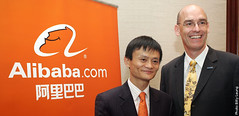e-Commerce in China: numbers and trends
China could become the world's biggest online market within two years: the number of Chinese netizens has surpassed 123 million and number of people with access to broadband connection rose by 45.3 percent during the first half of the year to 77 million. Studies show that a typical Chinese consumer spends an average of 17.9 hours per month (36 min./day) engaged in popular online activities such as chatting, blogging, gaming, and shopping.
If foreign businesses want to get in on the action in China, though, they should learn to speak the language. Eighty-five percent spend their time viewing mainland Chinese-language content, while only three percent viewed overseas foreign language content. "The Internet industry is attached to content," said Professor Guo Liang of the Beijing-based Chinese Academy of Social Sciences, refering to the 18th Statistical Survey Report on the Internet Development in China.
China reports a total of 694,000 websites, over 20% being individual's. The number of domain names surged 40 percent to reach 2,592,000, according to the report on China's Internet information and resources 2005 published by the State Council Informatization Office.
E-commerce has been slow to develop in China, though, for several reasons including low penetration rates of credit cards, consumer trust issues, and poor logistics and distribution channels. Eager to tap into China's consumer revolution, both Chinese and foreign companies like China Mobile, DHL and UPS have invested the money and time needed to address these issues.
The efforts have paid off. Chinese consumers now flock to online shopping sites like Amazon's subsidiary Joyo and competitor Dangdang, which recently raised $30 million USD from venture capital firms Doll Capital Management and Walden International. Joyo alone is expanding services from book selling to include electronics and other products and is becoming a de facto online shopping bazaar. The number of goods offered on Joyo's website have increased from 45,000 to 450,000 in the past 2 years.
Joyo's rise mirrors the growth numbers of e-commerce in China. An estimated 2.08 million Chinese bought products and services online in 2001. In 2006, the number of Chinese consumers making orders online will rise to over 20 million according to estimates by the China Market Research Group CMR. This year two in three people are expected to buy online, with books and computer gear proving particularly popular.
Other mind boggling statistics reflect the growth in all areas of e-commerce: in 2004, the entire Chinese Auction market was about $561 million; in 2005 that number jumped 200% and reached $1.7 billion, with Taobao being the strong player. According to Alibaba.com CEO Jack Ma, Taobao will dominate China online auctions, going head on against eBay.
If such momentum of growth continues, China's on-line transactions are expected to reach one trillion yuan this year (something around 89 billion dollars), a sharp rise from last year's 700 billion yuan."It means China is ready for a boom in e-commerce," said Chi Congbing, analyst with CCID Consulting.















If foreign businesses want to get in on the action in China, though, they should learn to speak the language. Eighty-five percent spend their time viewing mainland Chinese-language content, while only three percent viewed overseas foreign language content. "The Internet industry is attached to content," said Professor Guo Liang of the Beijing-based Chinese Academy of Social Sciences, refering to the 18th Statistical Survey Report on the Internet Development in China.
UPDATE: I'm moving this blog to http://designative.info
China reports a total of 694,000 websites, over 20% being individual's. The number of domain names surged 40 percent to reach 2,592,000, according to the report on China's Internet information and resources 2005 published by the State Council Informatization Office.
E-commerce has been slow to develop in China, though, for several reasons including low penetration rates of credit cards, consumer trust issues, and poor logistics and distribution channels. Eager to tap into China's consumer revolution, both Chinese and foreign companies like China Mobile, DHL and UPS have invested the money and time needed to address these issues.
The efforts have paid off. Chinese consumers now flock to online shopping sites like Amazon's subsidiary Joyo and competitor Dangdang, which recently raised $30 million USD from venture capital firms Doll Capital Management and Walden International. Joyo alone is expanding services from book selling to include electronics and other products and is becoming a de facto online shopping bazaar. The number of goods offered on Joyo's website have increased from 45,000 to 450,000 in the past 2 years.
Joyo's rise mirrors the growth numbers of e-commerce in China. An estimated 2.08 million Chinese bought products and services online in 2001. In 2006, the number of Chinese consumers making orders online will rise to over 20 million according to estimates by the China Market Research Group CMR. This year two in three people are expected to buy online, with books and computer gear proving particularly popular.
Other mind boggling statistics reflect the growth in all areas of e-commerce: in 2004, the entire Chinese Auction market was about $561 million; in 2005 that number jumped 200% and reached $1.7 billion, with Taobao being the strong player. According to Alibaba.com CEO Jack Ma, Taobao will dominate China online auctions, going head on against eBay.
If such momentum of growth continues, China's on-line transactions are expected to reach one trillion yuan this year (something around 89 billion dollars), a sharp rise from last year's 700 billion yuan."It means China is ready for a boom in e-commerce," said Chi Congbing, analyst with CCID Consulting.














